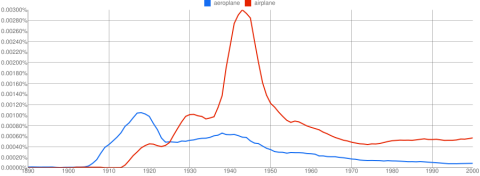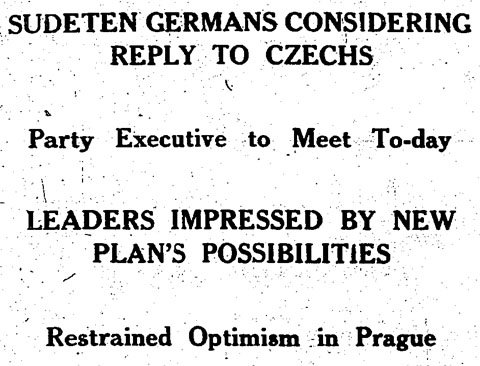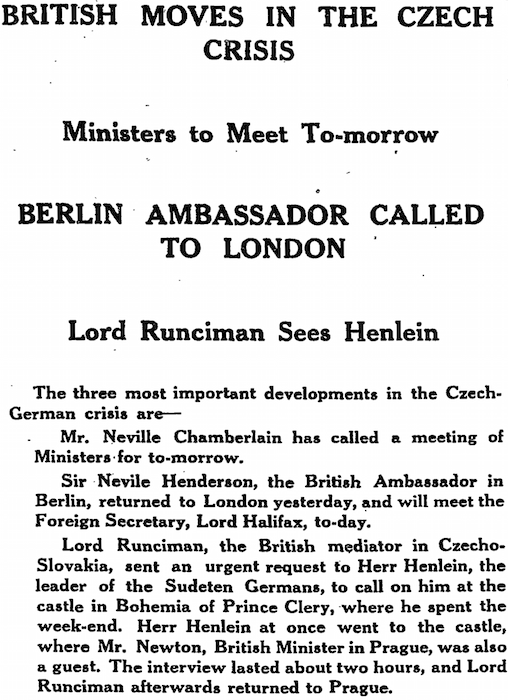Cecil Day Lewis, ‘Bombers’ (1938):
Through the vague morning, the heart preoccupied,
A deep in air buried grain of sound
Starts and grows, as yet unwarning —
The tremor of baited deepsea line.Swells the seed, and now tight sound-buds
Vibrate, upholding their paean flowers
To the sun. There are bees in sky-bells droning,
Flares of crimson at the heart unfold.Children look up, and the elms spring-garlanded
Tossing their heads and marked for the axe.
Gallant or woebegone, alike unlucky —
Earth shakes beneath us: we imagine loss.Black as vermin, crawling in echelon
Beneath the cloud-floor, the bombers come:
The heavy angels, carrying harm in
Their wombs that ache to be rid of death.This is the seed that grows for ruin,
The iron-embryo conceived in fear.
Soon or late its need must be answered
In fear delivered and screeching fire.Choose between your child and this fatal embryo.
Shall your guilt bear arms, and the children you want
Be condemned to die by the powers you paid for
And haunt the houses you never built?
Stephen Spender, ‘Responsibility: the pilots who destroyed Germany in the spring of 1945’ (1947):
I stood on a roof top and they wove their cage
Their murmuring throbbing cage, in the air of blue crystal.
I saw them gleam above the town like diamond bolts
Conjoining invisible struts of wire,
Carrying through the sky their geometric cage
Woven by senses delicate as a shoal of flashing fish.They went. They left a silence in our streets below
Which boys gone to schoolroom leave in their playground.
A silence of asphalt, of privet hedge, of staring wall.
In the glass emptied sky their diamonds had scratched
Long curving finest whitest lines.
These the day soon melted into satin ribbons
Falling over heaven’s terraces near the golden sun.Oh that April morning they carried my will
Exalted expanding singing in their aeriel cage.
They carried my will. They dropped it on a German town.
My will expanded and tall buildings fell down.Then, when the ribbons faded and the sky forgot,
And April was concerned with building nests and being hot
I began to remember the lost names and faces.Now I tie the ribbons torn down from those terraces
Around the most hidden image in my lines,
And my life, which never paid the price of their wounds,
Turns thoughts over and over like a propellor
Assumes their guilt, honours, repents, prays for them.
![]() This work is licensed under a Creative Commons Attribution-NonCommercial-NoDerivatives 4.0 International License.
Permissions beyond the scope of this license may be available at http://airminded.org/copyright/.
This work is licensed under a Creative Commons Attribution-NonCommercial-NoDerivatives 4.0 International License.
Permissions beyond the scope of this license may be available at http://airminded.org/copyright/.






Both minor poets and minor poems not very well executed. Eliot in Four Quartets (Little Gidding) handles the issue of bombers much better.
Pingback: Airminded · Bomber County
I could say that as a historian I’m not all that interested in whether or not they are minor poets and poems, but in what they said, when they said it and why. But then as I just dumped the poems here without any explanation I can’t blame you for going in that direction!
I suppose my point was to contrast the subjects of the poems: in 1938 fear of what their bombers will do to us, in 1947 remorse for what our bombers did to them. The former sentiment could be fairly held to be representative of its day, but I don’t think you could say the same of the latter.
Even as a historian there are considerable benefits to be had from examining poetry as a reflection of the attitudes of the time. However, it is important to focus on the first rate poets rather than the second rate poets who tend to reflect their own narrow circle – your second paragraph recognises that issue with the Spender. Eliot ties in nicely with the big issue of the time – what is this England we’re fighting for? (With due respect to all the Empire combatants – the Second World War was more of a defining moment for the nation of Britain). What is the ‘matter of Britain’? Neither Lewis or Spender had anything of substance to say on the real issue and both were rather superficial. So they seem to make a contribution to the subject but in fact have no bearing on it.
I disagree that I should be classifying poets into first-rate or second-rate before using their work. That’s the job of a literature critic, not a historian. Nor would I read their poems for their own insights into their times. I would read their poems as evidence for what they thought was worth writing about, what publishers thought was worth publishing and what readers thought was worth reading. (Or did not — which is also revealing.) Whether the poetry is good or not, has anything of ‘substance’ to say doesn’t enter into it, as far as I’m concerned.
To continue with the examples here, if I conceded that as you say Spender’s poem, being second rate, only reflects his ‘own narrow circle’, then what does that say for the Day Lewis? You also say this is a second rate poem from a second rate poet, yet he was writing about a topic which was on the minds of so many people in 1938. That’s why it interests me; its quality as a poem does not. Speaking as a historian, that is.
Now this is interesting – I would argue any historian needs to evaluate and classify their sources no matter where they derive from. You can also gain a lot of understanding from the the literature of a period. I feel it is also a mistake to assume that you as a historian cannot judge a poem (some it must be admitted can’t). One also has to be careful with publishers or readers – poetry has always had a small circulation and is not a mass market product. Identifying what is first rank is very important here. This why some discrimination is necessary with poetry.
Was Cecil Day Lewis writing about what concerned people in 1938? – actually I don’t think so. His tone of expression actually harks back to the Georgian poets and is affected and stilted (which is an adequate description of all the Georgians). The superficial use of the topic makes it appear relevant but in fact it isn’t really that relevant at all. In fact this is where good literature can be so valuable, it shows what the main ideas of the time were. Both good poets and good authors actually use their personal experiences to comment on the times they live in. If as historians we are concerned with what people actually think we need to be careful with literature sources. Where so many people occupied with bombing in in 1938 – I would suggest not. No one had the experience and so no one knew. Ignorance is bliss as they say.
“Where so many people occupied with bombing in in 1938 – I would suggest not.”
Um, have you been reading this blog at all? If we want to stay on the literary level, why on earth did Shute write _What Happened to the Corbetts_? Why did all those newspapers carry stories about ARP?
Shute’s book was actually published in April 1939 and so is a bit outside 1938 but is definitely relevant. However, Shute was not the only author and most were not writing at all about bombing. Shute was employed by a major aircraft manufacturer and could be expected to take the official line rather than society’s line. With other other authors, topics mentioned relating to the war mostly related to China. There was a stunning complacency on the part of most people which is why you have newspapers and cigarette cards trying to educate them.
Yes to laboured, I agree. But…
Now I tie the ribbons torn down from those terraces
Around the most hidden image in my lines,
And my life, which never paid the price of their wounds,
Turns thoughts over and over like a propellor
Assumes their guilt, honours, repents, prays for them.
Kind of like many people’s attitude to soldiers in Iraq, yes?
Christopher:
I wonder if we’re not talking at cross-purposes to some degree.
Of course historians need to evaluate sources, and of course poems can be sources. I never said otherwise; in fact I said just that. What I mean is that as a historian I’m not interested in their aesthetic qualities. What you or I think of poems as poems does not tell us anything about the time at which they were written, only about our own tastes. And of course poetry has a small circulation. That’s another reason why I’m not that interested in it as a primary source.
Why is it ‘superficial’? Are the subjects of poems not worth discussing or is it all about formal structure?
Sure, they do, but it’s still only their own personal opinion of the times they live in. Why should I privilege one poet or novelist over dozens or hundreds of others, just because they are classed as ‘good’ by us today? Call it the Jessie Pope test. She was easily the best selling British poet of the First World War. Yet today her poems are generally regarded as pretty awful. But because she was so widely read I would argue she was expressing ‘the main ideas of the time’ far better than Owen, say.
I have to agree with Chris here! This is pretty much what my research is all about. (Have a look at some of my Sudeten crisis posts, or this one for 1938 stuff. Oh, and this on What Happened to the Corbetts, which is interesting because it wasn’t particularly representative of the numerous knock-out blow novels published by then.) And it was precisely because of the (relative) inexperience of bombing that people were scared. Ignorance breeds fear, as they also say :)
David:
Haven’t seen you for a while! That’s interesting, though the burdens were much more widely shared in WWII. I suppose the inequality of sacrifice/guilt is a feature of all wars, just more extreme in our current ones than most.
Brett
The point about good authors and poets is that their antennae are more finely tuned to the circumstances and fundemental ideas of the time. They are more able to express the ideas and give a better idea of what were the major concerns than say newspapers which are more concerned with sensationalism. And here we can be a bit absolutist and say that it is not a matter of relativism – one can differentiate quite clearly between good and bad and one needs to do so. So a historian needs to be aware of the aesthetic qualities of his material when he is using material from a medium where an aesthetic quality is necessary. Poorly expressed ideas are symptomatic of a misunderstanding of the reality behind the message. Well expressed ideas show the reality more.
On the point of fear of bombing – I would disagree. It wasn’t really a major concern until it happened. Fear of war itself could be said to be a fear that many people had but not bombing itself. This comes through again and again in contemporary literature – people discuss what Hitler is going to do, they don’t discuss bombing or its dangers. We can be too influenced by press and government sources rather than what society thought. There was a gap here and you can think of a lot of the efforts as attempts to educate a disinterested public. Knowledge of the unknown breeds fear not ignorance. Ignorance breeds a certain kind of indifference. Whatever happend to the Corbetts is interesting in that it was issued free to ARP Wardens as a primer. However, it came out at a time when war was fairly certain to happen in the near future. This is significant and I would suggest that we should think of the book more as a war novel than a pre-war novel.
You make some good points about relying too much on government and press sources for ‘what society thought’. And yes, they were efforts to influence public opinion, not reflections of it. But I frankly find it bizarre that you would rather privilege such elite sources as poetry and literature as a way into public opinion instead. You keep asserting that the ‘best’ poets and writers have some profound insight into the ‘real issue[s]’ of the day but don’t offer any evidence for this. This is an assumption that you just can’t make — and it’s implausible on the face of it, because elite poets and writers almost self-evidently were different from the larger population in many ways: class, gender, education, ethnicity, occupation, the very fact that they thought of themselves as somebody with something valuable to say. You just can’t read them and assume you now know something deep about what the men and women on the Clapham omnibus thought. (And as for aesthetic judgements — I stand by the Pope test.)
On the fear of bombing: it was not constant, nor was it always increasing, but it was there, starting in 1917 or 1922 and really taking off in 1934-5 and peaking in 1938. Admittedly, my understanding of this comes mostly from newspapers (along with popular fiction and non-fiction — not so much elite writing) and as I acknowledge above these are not unproblematic sources. But at least we know that people did get a lot of their information about the world from them, as opinion polls and Mass Observation evidence from the late 1930s show. So they surely had some significant effect on public opinion as a whole, which is more than you can say for poetry, however well-written, beyond a narrow circle of readers.
I was reminded by this discussion, and some others, of a poem on the men of Bomber Command that I decided to post on my blog here.
http://vintageaeroplanewriter.blogspot.com/2010/11/bomber-command-poem.html
I’m sure the author wouldn’t be regarded as anything but a ‘minor poet’, and the poem given much artistic status, but for what it’s worth, it has a basic sincerity and pathos that works for me.
Thanks for the link and the poem. I agree, it has a value which doesn’t depend on its artistic merit.